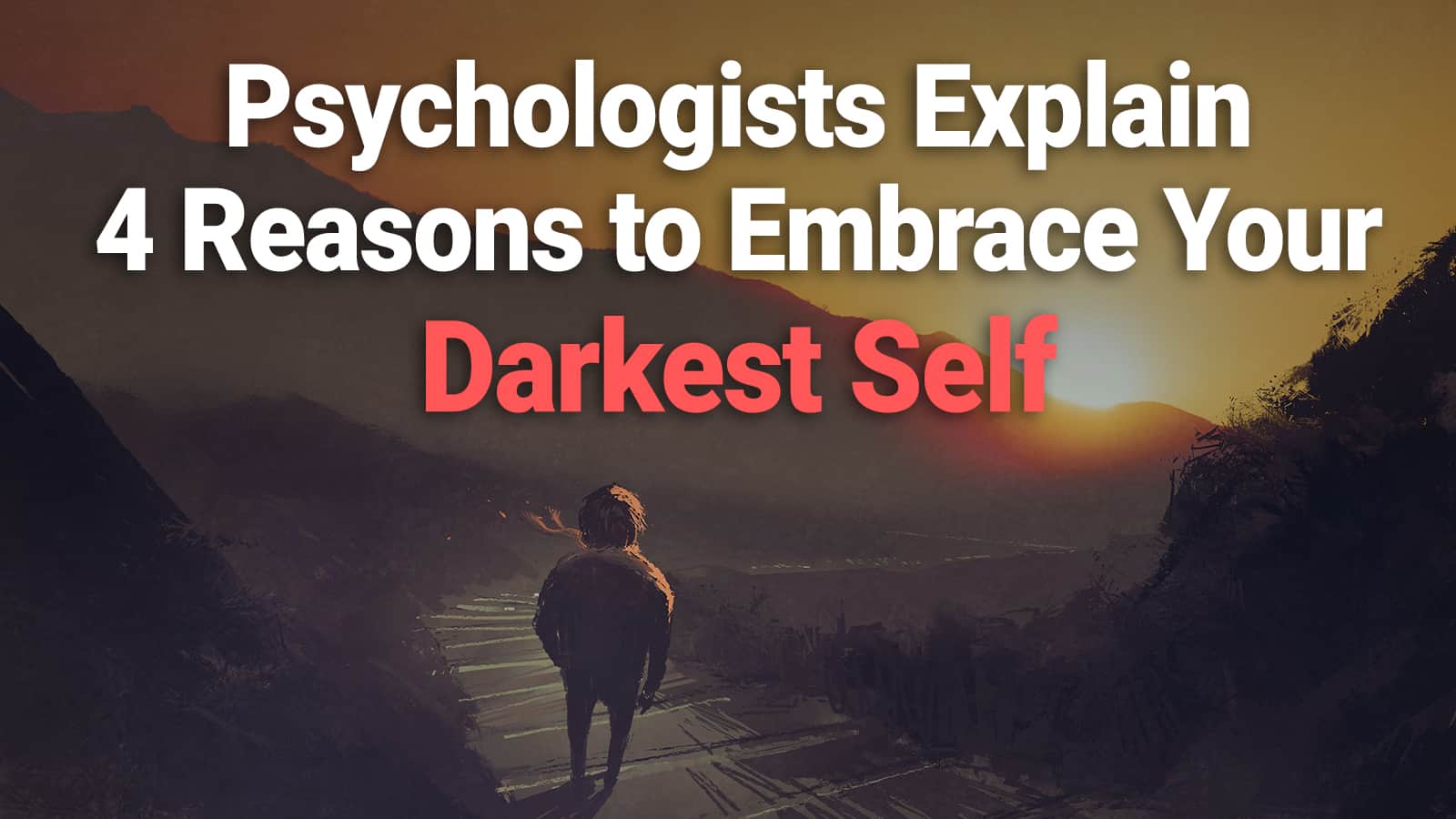We talk a lot about positive thinking on our site, but what you may not know is that it’s equally important to embrace negativity as well. As the quote above says, you cannot have light without darkness. So, in order to accept both sides of yourself, you need to get to know them both very well.
Embracing your darkest self doesn’t mean you have to wallow in negativity and lose sight of what makes you shine; it just means you need to understand it better. In this world, we often put on a mask for others because society tells us what it acceptable. You might hear people say, “Smile more!” or “What’s wrong?” if you don’t look happy 24/7. Of course, many people also put on a happy face for others because showing negative emotions is largely looked down upon in our society.
This alone might be contributing to the anxiety and depression epidemic because people feel that they cannot show other sides of themselves. We have to put on so many masks for others that we can start to lose sight of who we really are. Embracing your darkest self will help you tap into parts of yourself that might have been “asleep” before and allow you to release judgement about negative emotions.
In this article, we’ll go over some reasons why going to the dark side (at least for a bit) may not be so bad after all.
Here are 4 reasons to embrace your darkest self:
“In order for the light to shine so brightly, the darkness must be present.” – Francis Bacon
1. It can benefit your mental health.
Acceptance is so important, especially in today’s world where we are bombarded with messages about who we should be. Advertisements, social media, and even our peers and family give us input about what we should buy, what we should be, what we should eat, and everything in between. So, to cut through all the noise in the outside world, you need to have a firm grasp of who you are.
Most people are easily influenced and get lost in this world because they aren’t centered; instead, they are swayed by the crowds and forget their true essence.
One study by psychologist professor Brett Ford actually found that acceptance of your darkest emotions can boost your mental health. According to Ford, “Acceptance involves not trying to change how we are feeling, but staying in touch with your feelings and taking them for what they are.” We are told to always remain positive, but human nature just doesn’t allow for that. As complex beings, we go through a myriad of emotions every day, and it’s time to start embracing that rather than denying our true selves.
The Study
In the study, researchers found that acceptance works across the board; it doesn’t discriminate based on race, socioeconomic status, or any other category. People of varying backgrounds had positive results when using acceptance to manage their emotions. Acceptance of your darkest self can mean using this method whether it’s during the hardest of times or simply for slight inconveniences.
For example, if someone close to you passed away, you can utilize acceptance to help you move through those dark emotions rather than pushing them down and bottling them up. On a lighter note, you can go back to acceptance if someone cut you off in traffic when you’re already running late. Acceptance works for a variety of situations, because in all instances, it teaches you to embrace what is happening rather than fighting it.
Ford added that acceptance plays the most important part in the act of mindfulness. She says it is linked with better mental health more than other teachings of mindfulness such as non-reactivity and observing. She says, “Acceptance, non-judging acceptance, seems to be the key ingredient to mindfulness.”
Three Tests of Acceptance
The study involved three different experiments that studied people’s emotions in various situations.
In the first part, questionnaires were sent to 1,000 undergrad students. The questions centered around mental health and emotional stability. The results, unsurprisingly, showed that students who practiced acceptance had fewer negative emotions and greater well-being.
In the next study, 156 people had to give a three-minute speech as part of a pretend job interview. The ones who practiced acceptance seemed to do much better than the ones who didn’t.
More than half of the participants chosen for this study had experienced a major stress in recent months. For the final study, the researchers asked 222 to keep a diary of the most stressful events that had occurred in the last two weeks.
Once again, the participants who practiced acceptance fared much better in this study. They seemed to take the stressful events in stride and were able to cope with all the situations they faced.
Now that you know how acceptance of your emotions can improve your mental health, we’ll move on to other reasons why acceptance is beneficial to you.
2. It helps you remain in the moment.
Accepting all your emotions – even those parts of your darkest self – means facing them rather than running from them. As you become more open to acceptance, you’ll notice that you remain more rooted in the present moment. You will open new doors to yourself and your emotions, which will deepen your experiences in life. Accepting the good, bad, and ugly emotions will also help you relate to others better, which can richen your relations with people.
Most people never stay in the moment due to ruminating about the past or future too much. Accepting your emotions can help you remain in the now. There are other factors to mindfulness, of course, but acceptance is a perfect way to start.
If something bad happens, acceptance will help you to move through the problem with greater mental focus and understanding. Acceptance allows you to understand your negative emotions on a deeper level and face a problem head-on rather than hiding from it.
3. You’ll get to know yourself better.
Most people live in denial of their true selves, or simply don’t take the time to truly know themselves. This can lead to a feeling of disconnectedness throughout your life, which means you won’t really be living at all. To live fully, you must accept and embrace all sides of yourself, which requires self-reflection and solitude. Being alone doesn’t have to feel lonely. In fact, it can be utterly liberating!
When you embrace your darkest self, you begin to understand your strengths and weaknesses much better. We all have darkness within us, but opening that door doesn’t mean you have to let that side of you take over. It simply means that part of you will no longer live dormant and misunderstood.
Freeing your darkest emotions will allow you to step into yourself more wholly and live life to the fullest. We should not be afraid of negative emotions, for they shape us just as much as the positive ones.
4. It will increase your self-compassion.
Being nonjudgmental toward ourselves is key when it comes to acceptance. Many of us are far too hard on ourselves in this life, which can lead to self-hatred and destructive behaviors. Compassion toward ourselves can help us have sympathy for the human condition, because none of us is perfect.
We all have flaws despite our greatest efforts to reach perfection.
So, increasing awareness and acceptance of yourself will lead to a more compassionate stance toward yourself and others. We have beat ourselves down too long in this life; it’s time to do the opposite and see the beautiful things that unfold from doing so. Self-compassion goes hand-in-hand with acceptance. In embracing yourself, you will start to view yourself as a friend rather than enemy.
Self-compassion simply means treating yourself as you would want a friend to treat you. It means embracing the fact that you will make mistakes and fail in life, but this doesn’t make you unlovable or unsuccessful. Compassion means accepting that you are human, too, and deserve your love and affection as much as anyone else.
Final thoughts on Embracing Your Darkest Self
As you can see, accepting your darkest self can greatly benefit your well-being. Not only can it boost your mental health, but it can keep you rooted in the present, allow you to understand yourself better, and increase compassion toward yourself and others. Acceptance of darkness doesn’t mean you have to shun the light. It simply means embracing both sides of yourself and accepting that human nature requires these two opposing parts.
Acceptance will allow you to live life more deeply and have a greater understanding about your place in it. Getting to know your dark side might seem scary, but it’s vital to your human experience. Without delving in to your true nature, you won’t be able to fully understand yourself, which will in turn affect your understanding of others.
Introspection is becoming a lost art, but it’s so important to our journeys as it helps us remove all the chatter and truly find ourselves.
https://www.youtube.com/watch?v=qWkzCo0h0Ok


















